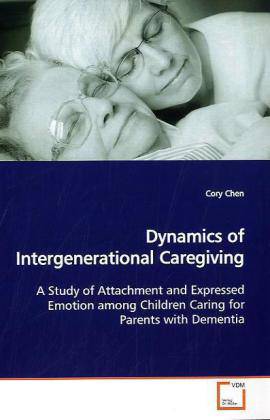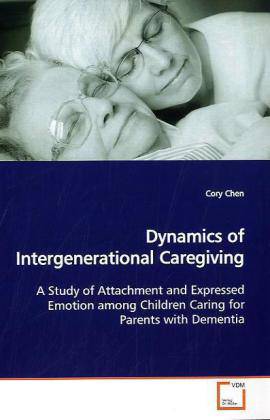
- Afhalen na 1 uur in een winkel met voorraad
- Gratis thuislevering in België vanaf € 30
- Ruim aanbod met 7 miljoen producten
- Afhalen na 1 uur in een winkel met voorraad
- Gratis thuislevering in België vanaf € 30
- Ruim aanbod met 7 miljoen producten
Zoeken
Dynamics of Intergenerational Caregiving
A Study of Attachment and Expressed Emotion among Children Caring for Parents with Dementia
Cory Chen
Paperback | Engels
€ 48,45
+ 96 punten
Omschrijving
Providing care for individuals with dementia is among
the most
difficult challenges facing families caring for older
partners and
parents. Although some aspects of the caregiving
experience are
consistent across families, there is significant
variability in the ways
families experience, perceive, interact and cope with
the task of
caring for their family member. Expressed emotion
(EE), the degree
of criticism or emotional over-involvement that a
caregiver
expresses towards their care-recipient, serves as a
useful
framework for characterizing the caregiving
environment and is
predictive of care-recipients outcomes across a
variety of
conditions. However, it remains unclear why some
caregivers
respond to care-recipients with high EE and others do
not. One
construct that may play a role in patterns of EE is
attachment. A
significant body of literature has demonstrated that
attachment
guides caregiving behavior across a variety of
relationships. This
book presents a study that examines the complex
relationships
between attachment and EE.
the most
difficult challenges facing families caring for older
partners and
parents. Although some aspects of the caregiving
experience are
consistent across families, there is significant
variability in the ways
families experience, perceive, interact and cope with
the task of
caring for their family member. Expressed emotion
(EE), the degree
of criticism or emotional over-involvement that a
caregiver
expresses towards their care-recipient, serves as a
useful
framework for characterizing the caregiving
environment and is
predictive of care-recipients outcomes across a
variety of
conditions. However, it remains unclear why some
caregivers
respond to care-recipients with high EE and others do
not. One
construct that may play a role in patterns of EE is
attachment. A
significant body of literature has demonstrated that
attachment
guides caregiving behavior across a variety of
relationships. This
book presents a study that examines the complex
relationships
between attachment and EE.
Specificaties
Betrokkenen
- Auteur(s):
- Uitgeverij:
Inhoud
- Aantal bladzijden:
- 104
- Taal:
- Engels
Eigenschappen
- Productcode (EAN):
- 9783639062250
- Uitvoering:
- Paperback
- Afmetingen:
- 150 mm x 220 mm
- Gewicht:
- 156 g

Alleen bij Standaard Boekhandel
+ 96 punten op je klantenkaart van Standaard Boekhandel
Beoordelingen
We publiceren alleen reviews die voldoen aan de voorwaarden voor reviews. Bekijk onze voorwaarden voor reviews.








